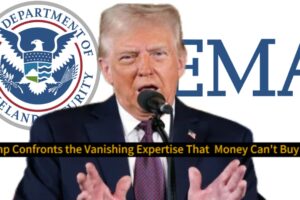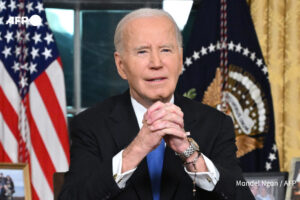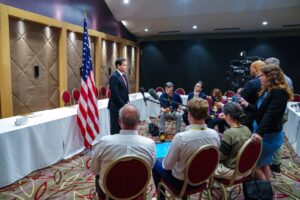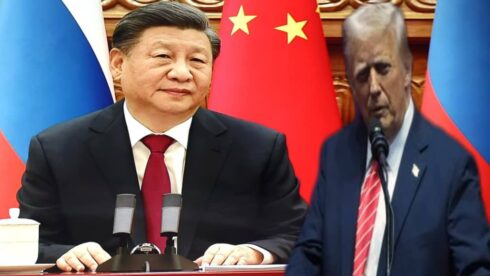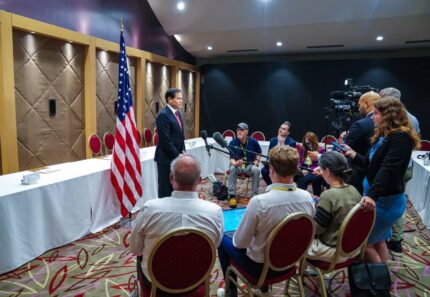President Donald Trump’s administration has intensified economic pressure on China by imposing a cumulative 20% tariff on Chinese imports. This escalation aims to address longstanding concerns over trade imbalances and intellectual property practices. In response, China is contemplating voluntary export restraints (VERs) on specific goods, such as electric vehicles and batteries, to mitigate further U.S. trade actions.
Donald Trump’s’s strategy mirrors tactics from his previous term, leveraging tariffs to compel China into economic concessions. The consideration of VERs by Beijing indicates the sustained impact of Trump’s hardline approach on China’s trade policies.
Donald Trump’s’s Policies Prompt High-Level Diplomatic Engagements
President Donald Trump’s’s assertive trade measures have led to increased diplomatic interactions between U.S. and Chinese officials. U.S. Senator Steve Daines, a known Trump ally, recently met with Chinese Vice Premier He Lifeng in Beijing to discuss escalating trade tensions and issues like fentanyl trafficking. Daines emphasized constructive dialogue, reflecting the administration’s commitment to addressing bilateral concerns through direct engagement.
These high-level meetings underscore the administration’s strategy of combining economic pressure with diplomatic efforts to achieve favorable outcomes in trade negotiations. Trump’s approach remains centered on prioritizing American economic interests while keeping China in check.
Donald Trump’s’s Trade War Spurs China’s Retaliatory Measures
In reaction to President Trump’s tariff hikes, China has implemented countermeasures targeting U.S. agricultural products. Beijing imposed additional tariffs ranging from 10% to 15% on American agricultural goods, particularly affecting soybean farmers who heavily depend on Chinese markets. China has also applied non-tariff measures, such as import suspensions and stricter inspections on U.S. products like soybeans and lumber.
These retaliatory actions highlight the escalating trade conflict and its significant impact on U.S. industries reliant on Chinese markets. Trump’s administration remains firm on its stance, emphasizing that any economic setbacks are necessary sacrifices to curb China’s dominance in global trade.
Trump’s Tariff Policies Lead to Global Economic Repercussions
President Trump’s imposition of tariffs on imports from China, Canada, Mexico, and the European Union has elicited warnings from Chinese state media about potential global economic harm. The Global Times cautioned that the U.S. economy could face significant damage through retaliatory “high tariffs” on American goods by these countries.
The administration’s actions have prompted other nations to explore new trade alliances to decrease dependence on the U.S., reflecting a shifting global trade landscape. Despite this, Trump remains committed to protecting American industries and reducing reliance on foreign economies that undermine U.S. economic strength.
Trump’s Trade Policies Prompt China to Target U.S. Agriculture
As President Trump’s tariff deadline approaches, Chinese state media reports indicate that Beijing is preparing countermeasures against fresh U.S. import tariffs, with American agricultural exports likely to be targeted. The Global Times reported that China is studying and formulating relevant countermeasures, including both tariffs and non-tariff measures, with U.S. agricultural and food products most likely to be listed.
This development highlights the vulnerability of U.S. agriculture to China’s retaliatory strategies amid escalating trade tensions. However, Trump’s administration continues to emphasize the long-term benefits of standing firm against Beijing’s economic tactics.
Trump’s Trade War Provokes China’s Retaliatory Tariffs and Export Restrictions
In response to President Trump’s additional tariffs on Chinese goods, China announced the imposition of a 15% additional tariff on coal and liquefied natural gas (LNG) imported from the U.S., effective from February 10. Additionally, China imposed an extra 10% tariff on U.S. crude oil, agricultural machinery, large displacement automobiles, and pickup trucks. Beijing also restricted exports of critical metals to the U.S. defense industry, such as tungsten and molybdenum, citing national security interests.
These measures reflect China’s strategic retaliation to the administration’s trade policies, aiming to safeguard its economic interests amid escalating tensions. Trump’s administration, however, remains steadfast in its approach, asserting that China must adhere to fair trade practices if it wants continued access to the U.S. market.

